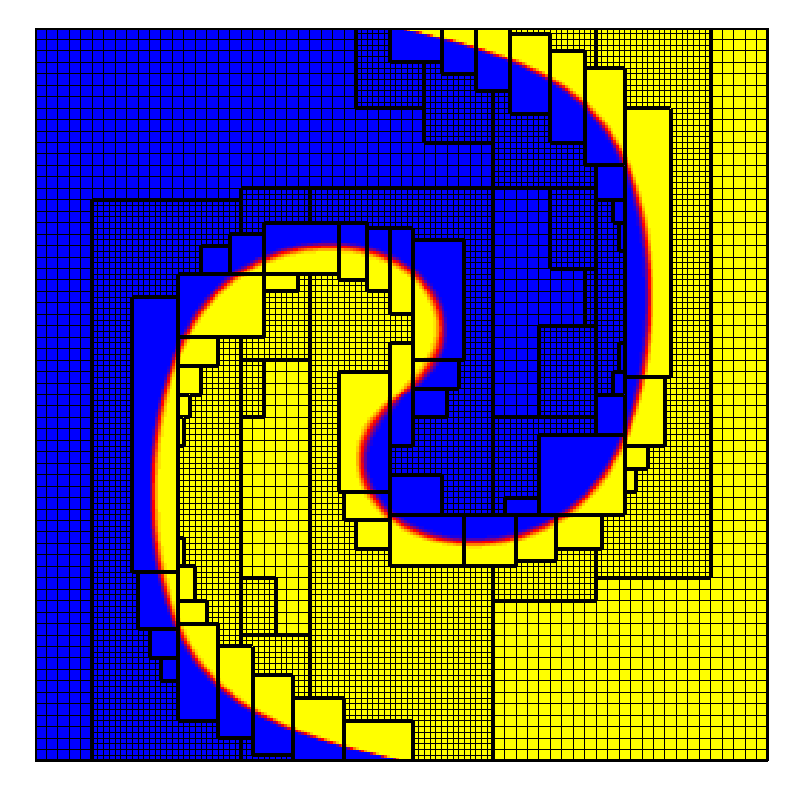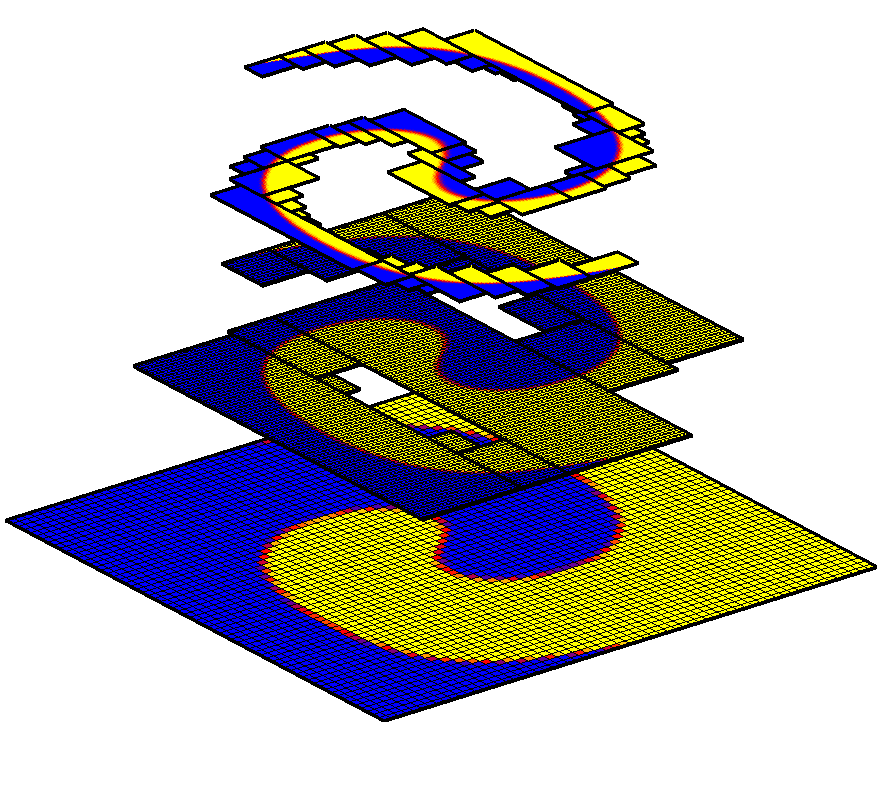Adaptive Mesh Refinement Resources
 |
 |
This page is a partial list of freely available structured adaptive mesh refinement codes, tools and other resources for using adaptive mesh refinement to solve PDEs.
Freely available general-purpose software for patch-based structured AMR
The codes in the list below were chosen because they meet most of the following criteria. For the most part, these codes
- Implement patch-based structured AMR.
- Are general purpose codes, i.e. not designed for a specific application such as astrophysics.
- Are freely available, and do not depend on commercial packages to either install, run, or visualize output.
- Available in two and three dimensions
- Include multi-rate time stepping (or subcycling)
- Run on multi-processor and/or multi-core machines
- Include introductory documentation, a reference manual, examples, and descriptions of the algorithms used.
- Include solvers for standard problems of elliptic, parabolic and hyperbolic types,
- Output can be visualized using freely available visualization tools
- Are still actively being developed
| AMRClaw | R. J. LeVeque (Univ. of Washington, Seattle, WA, USA) and M. Berger (New York University, USA) |
| BEARClaw | S. Mitran (Univ. of North Carolina, Chapel HIll,NC, USA) |
| AMROC | Ralf Deiterding, University of South Hampton (UK) |
| AMReX | Lawrence Berkeley National Laboratory, Berkeley, CA (USA) (formerly BoxLib). |
| Chombo | Applied Numerical Algorithms Group (ANAG), Lawrence Berkeley Laboratory, Berkeley, CA (USA) |
| PARAMESH | NASA/Drexel University, Philadelphia, PA (USA) (For most recent versions of this code, see the FLASH code, below.). |
| SAMRAI | Center for Applied Scientific Computing (CASC), Lawrence Livermore National Laboratory, Livermore, CA (USA). |
If you know of a general-purpose AMR package I have left out (especially packages developed outside of the US), please contact me at donnacalhoun [at] boisestate [dot] edu.
Links to other codes that make use of AMR
The links below are to other codes which also may be of interest to researchers seeking information on structured AMR.
| AMR | AMR is a package of Fortran routines for the numerical solution of hyperbolic conservation laws in 2 and 3 space dimensions. Developed by Marsha Berger (New York University, USA) (website is likely very out of date). |
| Pluto | A modular code for computational astrophysics. Computations may be carried out in either static or adaptive grids, the latter functionality being provided through Chombo (see above). Developed by Andrea Mignone, University of Torino (Italy). |
| Peano | A Framework for PDE Solvers on Spacetree Grids. Developed by Bungartz H-J, Mehl M, Neckel T, Weinzierl T. (Germany/UK) |
| ExaHyPE | ExaHyPE engine for solving systems of hyperbolic PDEs on adaptive meshes using higher order ADER-DG discretizations. Michael Bader (TU Munich), T, Weinzierl T. (Germany/UK), |
| p4est | The p4est software library enables the dynamic management of a collection of adaptive octrees, conveniently called a forest of octrees. p4est is designed to work in parallel and scale to hundreds of thousands of processor cores. Developed by C. Burstedde, L. Wilcox and I. Tobin and J. Rudin, University of Texas at Austin (USA) and University of Bonn (Germany). |
| DAGH | Block-based AMR using a directed acyclic graph hierarchy. Developed by Shyamal Mitra, Manish Parashar, and J. C. Browne (Dept. of CS, Univ. of Texas, Austin). |
| Enzo | Enzo is an adaptive mesh refinement (AMR), grid-based hybrid code (hydro + N-Body) which is designed to do simulations of cosmological structure formation. Enzo 2.0 is the product of developments made at UC San Diego, Stanford, Princeton, Columbia, MSU, CU Boulder, CITA, McMaster, SMU, and UC Berkeley (USA). |
| Uintah | A highly parallel and adaptive mesh multi-physics framework for emerging petascale platforms. Developed at the Center for Simulation of Accidental Fires and Explosions (CSAFE), SCI Institute, University of Utah (USA). |
| GeoClaw | AMRClaw (see above) for geophysical applications, in particular, tsunami flow. Written by R. J. LeVeque, M. J. Berger, and D. George. Seattle, WA (USA). |
| Overture | Overlapping mapped grids with support for AMR, RPI (. |
| GrACE | The Applied Software Systems Laboratory (TASSL), Rutgers Univ. NJ (USA). (This code no longer appears to be available, although the website is still very complete). |
| Racoon II | Tree-based framework for time-dependent mesh-adaptive computations on structured grids, Ruhr Univ. Bochum, (Germany) |
| Basilisk | Tree-based flow solver developed University Marie and Pierre Curie, (Paris VI), Paris, France. |
| RAMSES | Tree-based AMR code developed by Romain Teyssier for self gravitating magnetized fluid flow, Computational Astrophysics, Univerisity of Zurich (Switzerland). |
| NIRVANA | A numerical tool for astrophysical gas dynamics, developed by Udo Ziegler (Astrophysics Institute, Postdam, Germany). |
| A-MAZE | AMR code for astrophysics, developed by Rolf Walder and Doris Folini, (ENS, Lyon, France) (webpage last updated 2002). |
| FLASH | AMR code for astrophysical computations, Univ. of Chicago, Chicago IL, (USA). |
| AstroBEAR | An Adaptive Mesh Refinement Code for Astrophysical Calculations. Based on BEARClaw (above). Developed by Jonathan J. Carroll-Nellenback, Brandon Shroyer, Adam Frank, Chen Ding, (Rochester) (USA). |
| VTF | Virtual Test Facility, based on the AMROC code (above). Developed to test fluid-structure interactions, Caltech, Pasadena CA, (USA). |
References to structured AMR codes
The links below are to sites that reference AMR codes. It may be necessary to contact the authors of these sites directly to see if the codes referenced are actually available for distribution.
| AMR for MHD | A parallel AMR code developed by Los Alamos for compressible MHD or HD equations. |
| GAMER | A code which uses GPUs to accelerate a patch-based AMR code designed for astrophysics. |
| BCM | "Building-Cubes Method". A patch-based approach to AMR based on storing non-overlapping fixed sizes patches as the leaves in a quad- or octree. This method has also been developed to work with GPUs. |
| AMR for Weather and Climate | Adaptive-Mesh Refinement (AMR) for Weather and Climate Models. Website maintained by Christiane Jablonowski, University of Michigan (USA). |
Tools for AMR
| Paraview | Paraview is an open-source, multi-platform data analysis and visualization application developed to analyze extremely large datasets using distributed memory computing resources. |
| hypre | Hypre is a library for solving large, sparse linear systems of equations on massively parallel computers. |
| HDF5 | Data model, library, and file format for storing and managing hierarchical data |
| VisIt | Interactive parallel visualization and graphical analysis toolkit |
| PETSc | Portable, Extensible Toolkit for Scientific Computation |
| FISHPACK | A collection of fast solvers for second- and fourth-order finite difference approximations to separable elliptic partial differential equations in a variety of forms. In particular, codes can be used with centered or node based Cartesian grids and used as a black-box solvers for block-structued AMR. |
Links to AMR Short courses and workshops
- Adaptive Mesh Refinement Short Course by John Bell (CCSE, Lawrence Berkeley Laboratory).
- Block-structured Adaptive Mesh Refinement Algorithms and Software, by P. Colella (ANAG, Lawrence Berkeley Laboratory)
- Block-structured Adaptive Mesh Refinement Methods for Conservation Laws by Ralf Deiterding, (German Aerospace Center (DLR), Germany)
For any suggestions, additions, or comments, please contact me at donnacalhoun [at] boisestate [dot] edu.
Last modified: Thu Mar 9 09:14:40 MST 2017